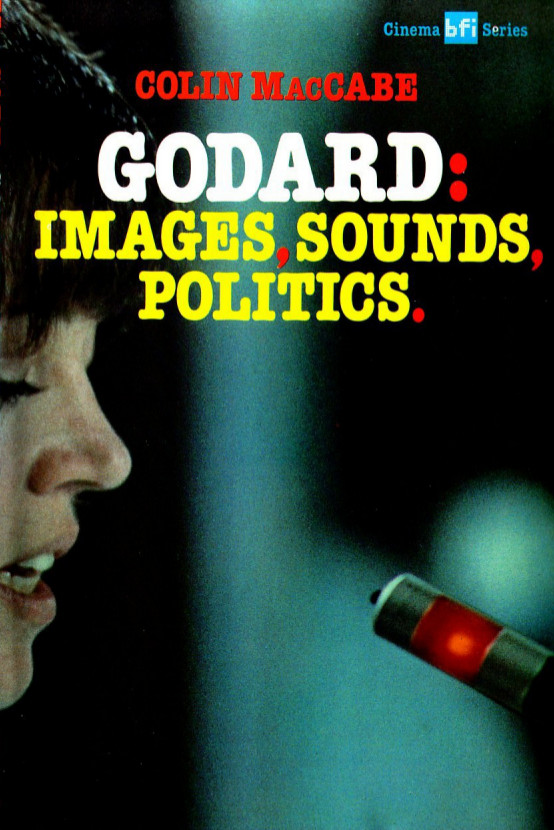Colin MacCabe: Godard: Images, Sounds, Politics (1980)
Filed under book | Tags: · cinema, film, film theory, maoism, montage, photography, politics, sexuality, technology, television

Godard: Images, Sounds, Politics is an important step in making Godard’s experiments in image and sound beyond the institutions of cinema and television visible. It reads the earlier films through the more recent work, focusing on politics, technology and sexuality. These insistent themes dominate Godard’s investigation of our representation in the image, a representation always inflected by sound. These terms enable us to understand more critical the circulation of money and images in which we participate, a circulation which Godard’s work cuts across.” (from the back cover)
Includes essays by Colin MacCabe, Laura Mulvey, and Mick Eaton. Also features interviews with Godard, a filmography, and a selected bibliography. Printed in black-and-white.
With Mick Eaton and Laura Mulvey
Design Richard Hollis
Publisher The Macmillan Press, London and Basingstoke, 1980
British Film Institute Cinema series
ISBN 0333290739, 9780333290736
175 pages
review of the book’s design (Eye Magazine)
Comment (0)Peter F. Drucker: Adventures of a Bystander (1978/1994)
Filed under book | Tags: · biography, economy, history, journalism, management, politics, technology

“Regarded as the most influential and widely read thinker on modern organizations and their management, Peter Drucker has also established himself as an unorthodox and independent analyst of politics, the economy, and society. Adventures of a Bystander is Drucker’s rich collection of autobiographical stories and vignettes, in which this legendary figure paints a portrait of his remarkable life, and of the larger historical realities of his time.
In a style that is both unique and engaging, Drucker conveys his life story – from his early teen years in Vienna through the interwar years in Europe, the New Deal era, World War II, and the postwar period in America-through intimate profiles of a host of fascinating people he’s known through the years. Their personal histories are, as Drucker tells us, the beads for which his own life serves as the string.
An amazing pageant of characters, both famous and otherwise, springs from these pages, illuminating and defining one of the most tumultuous periods in world history. Along with bankers and courtesans, artists, aristocrats, prophets, and empire-builders, we meet members of Drucker’s own family and close circle of friends, among them such prominent figures as Sigmund Freud, Henry Luce, Alfred Sloan, John Lewis, Buckminster Fuller, and Marshall McLuhan.
A brief encounter with Freud becomes the catalyst for an absorbing, multidimensional description of the economics, politics, and social psychology of pre-World War II Europe. Drucker introduces us to Fritz Kraemer, a brilliant, monocle-wearing eccentric who became an influential mentor to the young Henry Kissinger. His personal memoir of Henry Luce documents the development of modern journalism, while in “The Indian Summer of Innocence,” he rescues and preserves the very heart of the American experience during the last New Deal years before World War II.”
Originally published in 1978 by Harper & Row, Publishers
Publisher Transaction Publishers, 1994
ISBN 1412814103, 9781412814102
344 pages
commentary (Michael Hohl)
Comment (0)Jodi Dean: The Communist Horizon (2012)
Filed under book | Tags: · capitalism, communicative capitalism, communism, melancholia, neoliberalism, occupy movement, politics, proletariat, technology

“Rising thinker on the resurgence of the communist idea.
In this new title in Verso’s Pocket Communism series, Jodi Dean unshackles the communist ideal from the failures of the Soviet Union. In an age when the malfeasance of international banking has alerted exploited populations the world over to the unsustainability of an economic system predicated on perpetual growth, it is time the left ended its melancholic accommodation with capitalism.
In the new capitalism of networked information technologies, our very ability to communicate is exploited, but revolution is still possible if we organize on the basis of our common and collective desires. Examining the experience of the Occupy movement, Dean argues that such spontaneity can’t develop into a revolution and it needs to constitute itself as a party.
An innovative work of pressing relevance, The Communist Horizon offers nothing less than a manifesto for a new collective politics.”
Publisher Verso Books, London, 2012
Pocket Communism series
ISBN 1844679543, 9781844679546
256 pages
Author’s lecture (video, 79 min)
Interview with author (New Left Project)
Reviews: Samuel Grove (review31).
PDF (updated on 2020-5-31)
Comment (0)
